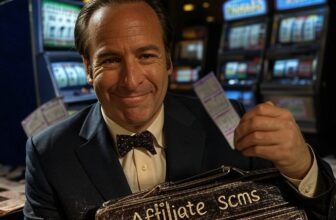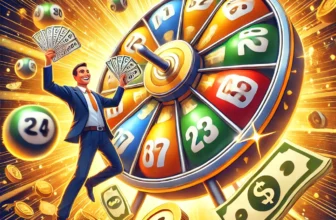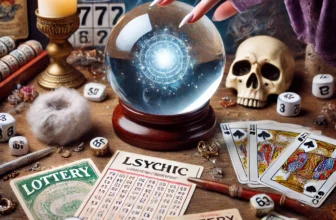Ah, the lottery. That magical institution where hope and mathematical improbability meet, promising riches beyond your wildest dreams—unless your wildest dreams include winning, in which case, don’t hold your breath. We’ve all been there: staring at the TV or your phone as those balls drop, thinking, “This could be it. This could be my big break.” But let’s face it—if you’re reading this, you probably didn’t win. So, how do lotteries actually work, aside from shattering dreams and making us question all our life choices?

What is a lottery?
Picture this: a state-sponsored game of chance where you, the innocent public, get to throw your money into a big ol’ pot, hoping to be one of the chosen few to pull out more than a receipt and a mild sense of regret. Most states in the U.S., along with D.C. (because politicians need hobbies too), run lotteries. Across the pond in the U.K., they’ve been at it since 1994, with their National Lottery being regulated by—get this—the Gambling Commission. Yep, they actually have a commission to make sure the gamble is as clean as possible. It’s like the most well-organized chaos you’ve ever seen.
A Brief (and Slightly Depressing) History of the Lottery
If you think gambling is a modern vice, think again. Humans have been wagering their fortunes and dignity since the dawn of time. In fact, lotteries as we know them began way back in 15th-century Burgundy and Flanders (that’s medieval France for those of you who skipped history class). Originally, they were created to fund defense forces and help the poor, which sounds noble until you realize that lotteries have always been less about charity and more about someone getting rich at your expense.

Fast forward a few centuries, and the lottery became a full-on European sensation. In France, King Francis I decided it was time to make lotteries official (and profitable, of course), while in Italy, the ruling d’Este family got in on the action too. Lotteries even survived the Roman Catholic Church’s moral objections—because who could resist the allure of easy money, right?
By 1863, Italy had its first national lottery, and before you could say “Mamma Mia!” the lottery evolved into games like keno, bingo, and the OG of all lottery games: Lotto. Meanwhile, over in England, Queen Elizabeth I jumped on the bandwagon in 1566, launching a general lottery to fund public repairs. It was a roaring success—so much so that King James I followed up with a lottery in 1612 to fund the Jamestown Colony in Virginia. Yes, the Jamestown Colony. So next time you play, just remember: lotteries have been disappointing people for centuries.
Lotteries took a break for a while because, you know, moral outrage, corruption, and organized crime tend to put a damper on things. But they made a glorious comeback in the 1960s when New Hampshire decided to revive the idea in 1964. Multi-state lotteries followed soon after, with Powerball and Mega Millions swooping in to crush your hopes and dreams in 1992 and 1996, respectively.
To find out more, have a look at our interesting article History of Lotteries.
Lottery Games: A Buffet of Disappointment
There’s more than one way to lose your money in a lottery! Scratch cards, daily draws, drawing balls, picking numbers—take your pick! The U.K. National Lottery has ThunderBall, Set For Life, and the classic Lotto, where you watch numbered balls slowly extinguish any last remnants of optimism you had.
Most lotteries involve a basic premise: a pool of balls with numbers printed on them, usually 50 or more. A machine (which we’ll get to in a second) randomly selects six numbers, and you’re supposed to match them to win. Sounds simple, right? Well, wait until you see the odds.
The Odds: Better Start Practicing for that Lightning Strike
Let’s talk about your chances of winning. In short, they’re terrible. But let’s break it down for fun! Imagine there are 50 balls in the pool, and you need to pick six. The odds of picking the first ball are 50:1. If you get that right, the odds of picking the next one are 49:1, and so on. By the time you’ve picked all six, you’re staring at odds of about 1 in 14 million. For context, you’re more likely to be struck by lightning, bitten by a shark, or hit by a falling piano. But hey, someone’s got to win, right?

For those who love math (bless your heart), here’s a quick calculation for a typical game: the odds of picking one ball out of 50 are 50:1. Now divide that by the number of balls remaining. So if you’ve picked two and didn’t win yet, your odds just got worse—48:1. The more you play, the more your wallet cries. But who needs to eat, anyway?
The prize can be a fixed jackpot—one lucky person walks away with a pre-set amount. Or, even better, a progressive jackpot, where the prize grows bigger and bigger until some lucky soul snatches it up, leaving the rest of us to weep into our losing tickets.
Meet the Machines: Ball Tumblers of Fate
Lottery machines may seem like benign little gadgets, but these things are designed to destroy your hopes in the fairest way possible. There are two main types: gravity pick and air mix machines. The gravity pick machine is basically a bunch of balls dropped into a spinning blender, but instead of a smoothie, you get a series of numbers that crush your dreams. The balls tumble through a transparent tube so that everyone can see that, yes, you’re still losing fair and square.
The air mix machine is a bit flashier, using jets of air to mix numbered ping pong balls. But these machines have a dark past—cue ominous music—thanks to the infamous 1980 Pennsylvania Lottery scandal, where some folks rigged the machine to keep certain balls from blowing to the top. They won $1.8 million, and the rest is history.
But fear not! Lottery organizations now take extra precautions, like keeping multiple sets of balls, weighing them before each draw, and locking them away in vaults, Indiana Jones style. So, there’s no need to worry—except about your bank account.
What Happens to the Money?
Ah, the million-dollar question. The short answer? Half of it goes poof! The winner typically walks away with just half of the advertised jackpot, with the other half funding public education. Yes, when you lose, at least you can tell yourself that you’re helping little Timmy learn algebra. New York alone raised $8.5 billion in 2012, with $2.9 billion going to schools—so even if you don’t win, someone, somewhere is learning something on your dime.

Payouts: Lump Sum or Payments?
In the U.S., when (if!) you win the lottery, you face a major life decision: take the cash all at once or spread it out in annual payments. Most people choose the lump sum because they’d rather handle the money themselves than rely on the state to play investment banker with their winnings. In this case, you’ll receive a portion of the advertised jackpot after taxes, and boom—congratulations! You now have a boatload of cash to blow in one epic spending spree.
If you choose annual payments, get ready for a long-term relationship with the state lottery. They’ll buy U.S. Treasury bonds on your behalf, and you’ll get a slice of the jackpot each year over the next 20 to 30 years. It sounds reasonable until you realize that inflation and taxes will slowly nibble away at the real value of those payments. It’s like getting paid in Monopoly money—sure, you’re technically winning, but it’s not quite the same thrill as having the cash upfront.
But here’s where it gets interesting: In most European lotteries, the process is much simpler and way more fun for the winner. You typically receive the full prize as a lump sum—no drawn-out payment plans, no complicated decisions, and best of all, no taxes! Yes, you read that right. In Europe, you keep the entire jackpot. The government doesn’t swoop in to take a hefty cut, and you don’t need to worry about Uncle Sam eyeing your winnings.
And as if that wasn’t sweet enough, many European lotteries even let you stay anonymous! That means you can quietly retire to your private island, while the rest of the world has no idea you just hit the jackpot. No awkward calls from long-lost cousins, no sudden influx of new “friends” asking for loans—just peace, quiet, and all the cash you won, tax-free.
Taxes: Because Winning Isn’t Painful Enough
In the U.S., when you win the lottery, the government doesn’t just congratulate you—they send you a bill. On top of the federal tax (usually 24% and up to 37% for larger winnings), many states have their own taxes. That jackpot is looking a lot smaller now, isn’t it? Meanwhile, Europe just laughs at us because they don’t tax lottery winnings at all.

Is the Lottery Worth Playing?
So, is it really worth it to throw your hard-earned money into the lottery, hoping for a life-changing win? Let’s look at the numbers: Americans spent a staggering $17 billion on lottery tickets in 2023 alone. That breaks down to an average of $50.19 per person for the year. Some folks are clearly spending much more than that, especially considering that a large portion of lottery revenue comes from a relatively small number of dedicated players.
In states like Minnesota, for example, 71% of lottery income comes from just 20% of players. Similarly, in Pennsylvania, 29% of players generate 79% of the revenue. These are often people from lower-income households, spending money they likely can’t afford to lose. So, is it really a smart move to keep buying those tickets?
While the odds are stacked against you—like, really stacked—the lottery still holds its appeal. Sure, your chances of winning are about as slim as getting struck by lightning while being attacked by a shark, but someone has to win, right? And it won’t be you unless you play.
But remember, putting all your hopes into a lottery ticket as a ticket out of financial struggles can lead down a dangerous road of obsession or even gambling addiction. At the end of the day, there are better investments out there with a lot more certainty and a lot less heartbreak.
References:
- Yahoo Finance. (2023). “How Much Do Americans Spend on Lottery Tickets?” Retrieved from finance.yahoo.com
- National Lottery History. The UK National Lottery. (2024). “Changing Lives” Retrieved from national-lottery.co.uk
- Powerball. (2023). “Prizes and Odds” Retrieved from powerball.com
- Mega Millions. (2023). “How To Play” Retrieved from megamillions.com
- U.S. Federal Tax Guidelines for Lottery Winnings. IRS. (2023). “Gambling Winnings: Taxable Income and Record-Keeping.” Retrieved from irs.gov
- History of Lotteries. Encyclopedia Britannica. (2024). “Modern lottery operations” Retrieved from britannica.com
- Lottery Odds and Statistics. (2024). “Global Lottery Comparison: Odds, Jackpots, Prizes, and More In-Depth” Retrieved from beatlottery.net








The PowerBall odds are 1 in 292 million, being struck by lightning is 1 in 18000.